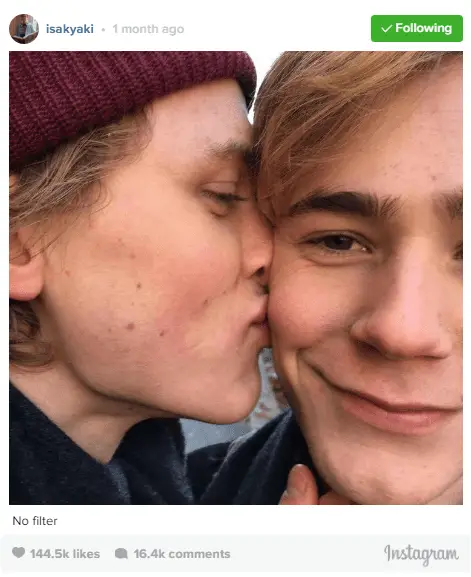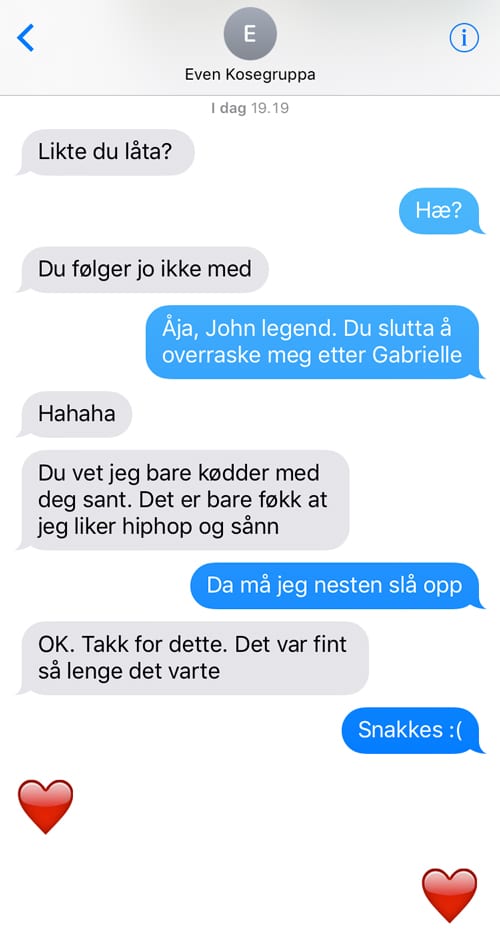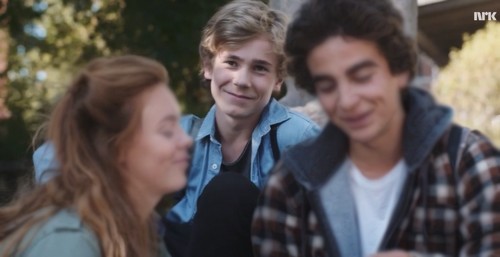I cannot stress enough what an extremely lovely surprise it was when, completely by accident, I found out about this little self-contained Norwegian show called Skam on Tumblr last November.
It’s been almost two months and what life has become after Skam is incredible. I decided to get my official polyglot title by learning Norwegian with Duolingo and found a very warm community to talk with about this show that is, simply put, what pretty much all shows staring teenagers should be. My goal with this article is to say every single beautiful thing I saw in Skam without spoiling you too much. So, before we start our conversation about the main man-loving man (MLM) romance, let’s talk about the show and the experience of watching it.

Created by Julie Andem, the show started in fall of 2015 and has aired three seasons. Each of these are focused on a different character: season one told the story of Eva; season two starred Noora; season three was all about Isak. Now, all of these characters are part of the same group of first year students that attend Nissen Hartvig, a high school in Oslo. Fun fact, the school actually exists and many of the actors in Skam have either attended or currently attend the school. Yes, I said attend because here’s another wonderful thing: the actors are ACTUAL teenagers.
Yeah. I know. Shocking. In a world where 30 year olds have been playing high schoolers in pretty much every popular teen show (Pretty Little Liars, Glee, Teen Wolf, and the list goes on), it is absolutely a breath of fresh air that 17 year old Tarjei Sandvik Moe plays 17 year old Isak Valtersen. And he is just one example of pretty much the whole cast, aged 16-21, playing characters also aged 16-21.

I don’t know about you all but, as a 19 year old, this was absolutely fucking fantastic for me. The show doesn’t use excess makeup to hide away acne, spots, and all of these so called “imperfections” that you never see on our lovely “teenagers” from Teen Wolf. The makeup that the girls wear actually looks like makeup that girls that age can do themselves. The wardrobe is incredibly reflective of their ages as well. The guys aren’t all muscled up – which I’m not saying is impossible for a teenager to be (see Riverdale’s 18 year old lead KJ Apa), but it’s much more unusual. The friendships and dialogue also seem incredibly genuine and reflective of real teenager interactions.
One of the most interesting things about Skam, though, is the format. The show airs on Friday nights, but during the week, the network, NRK, posts timestamped clips on their website that will make up the episode. For example, if Isak has a scene that takes place on Tuesday 12pm, then at this exact day and time, the clip would go live. This creates a more interactive and inclusive experience with the show given that we will see what our focus character is seeing in ‘real’ time.

Social media enhances the viewing experience as well. NRK’s Mari Magnus is responsible for creating instant message conversations and Instagram posts that give more depth to the characters. The show itself uses the on-screen text message format we are getting more and more used to seeing. Oh, and another plus, they actually use real software and hardware. This may just be a nitpick of mine, but if there’s something that breaks my suspension of disbelief on a show like How To Get Away With Murder it is their made up replacements for iPhones, Instagram, Snapchat, and Grindr (yes, there’s also actual Grindr on Skam).
A couple things can be a bit weird for the casual American viewer of Skam, specifically issues like representation and the age of consent in Norway. From what I read from native bloggers, the show is made by and for norwegians. This means that, yes, the majority of the cast is white, the three big exceptions being Jonas Vazquez, Sana Bakkoush and Mahdi Disi. Apparently, by Norwegian standards, the show is considered diverse, including even their own indigenous population.

When I first started watching it, I felt a bit off about Even being 19 and Isak 17 because of my own knowledge about what is considered illegal in the US. I even wondered if Even was taking advantage of Isak. Later, I learned that the age of consent in Norway is 16, so by Norwegian law, it’s not considered a problem. Plus, it is very clear by the narrative that both have deep feelings towards each other, and Isak is not just being passively dragged along in this relationship.

The fact that the several actors are minors (under 18) prompts NRK to keep an extra watchful eye, especially now that the show has gained international attention because of its amazing portrayal of a MLM couple. These actors are still in high school, have jobs, and Norway seems to be a more privacy led country, so the actors don’t really go on press conferences and are usually on the down low.
When it comes to the fandom, I’d say that 99% of the watchers are amazing, creating an absolutely welcoming atmosphere online. The anomalous 1% are the ones that make sexual fanart/fanfic of the characters and try to take unwanted pictures of the actors at school or at their workplace. This may be a common thing in the US, but it is frowned upon heavily in Norway. What sucks is that, because of the attention, the high school used in the show had to address the issue of so many people visiting it and stalking the actors.
Finally, the plot. I have to confess I barged through the Skam doors into season 3 because I thought this show was more like Skins which changed all the characters every two seasons, but it wasn’t quite like that. Going into Season 3 for the gays was somewhat fine – I just had a couple of issues with names and Norwegian stuff. After I had ended that season, I went back and binged the other two and saw that I had missed a bunch of backstory. For instance, Noora (the Season 2 focus character) is highly featured in the first season and so is Isak and his best friend, Jonas.

What I can tell you guys about the first two seasons without being too spoilery is that it is an incredibly feminist tale of two characters. Eva is dealing with her first year of high school, trying to making friends, her boyfriend Jonas, and past enemies. This had one of the few (if not only) instances when girls calling other girls “sluts” is called out and it is beautiful.
In fact, the first two seasons focus on the same group of five girls while they are preparing for their “russ” experience – a Norwegian tradition that takes place at the end of their third and final year of high school.
Season 3, however, is where it got much more attention, especially from international fans. For starters, the trailer that announced who would be the main character was just as incredible as it was incredibly bold.
https://www.youtube.com/watch?v=Hzd_Z1LPHsE
As it is stated in this brilliant technical analysis, “[the trailer] is one of the clearest examples i’ve ever seen of a camera-observer that has been consciously constructed as occupying a non-heterosexual male subjectivity – in this case, very specifically, a gay male subjectivity. Where the cinematic gaze, with its focus on catering to an assumed heterosexual male audience, shies away from ever showing men/men’s bodies as the objects of sexual attraction or fantasy, this trailer does the exact opposite”.

Isak’s story is much more than a simple “coming out” through ten episodes. It’s about learning – and, oh, SO MUCH learning. The Isak that starts out on the premiere is a completely different one from the finale.
Not only does he accept himself as a gay boy, he has characters all around him teaching him about internalized homophobia, prejudice, and mental illness. It is through Even Bech Næsheim that he finally gets out of his shell to experience love, but it’s with a lot of help and support that he went through this transition.

I really don’t want to spoil certain plot points, but I guarantee that the show is everything but a shock-value-led one. Everything is earned. The life lessons that we can get from it are incredibly well put. For example, Sana, a friend of Eva’s and Noora’s, gets paired up with Isak for their biology class and in one of the biggest moments of the show, Sana puts her own pride, faith, and stubbornness aside to tell him that she found actual research about how homosexuality is important for evolution. In a series of well put phrases, she discredits the whole “muslims are inherently homophobic” idea. It’s beautiful.
In situations like these, I find that someone closer to it has a better say than I do, so I’d like to quote this post I found from a queer muslim on how that scene was cathartic and validating:
“As a queer muslim person, watching today’s SKAM clip hit close to home. Being a part of two identities that are often said to be mutually exclusive, Sana’s words to Isak felt like the muslim part of me validated the queer part of me. When she told Isak “if anybody uses religion to legitimize their hate, don’t listen to them”, she spoke to break the wall inside me between my faith and my sexual orientation. And I cannot thank SKAM, and whoever writes Sana, enough for this beautiful representation. I already love SKAM so so much but today’s clip just made it very personal. I really wish that Sana is the next season’s main character.”
Skam is also probably one of the first shows I watch that actually used the words “Bisexual” and “Pansexual”. What’s better? The context: Isak coming out to his friends while he is still on the phase of “I’m not gay. Ok… I might be a little gay” and the guys (discount bros, actually) are trying to make him more comfortable, steer the conversation to another topic – a party – and at the same time validate his experience while he is himself figuring it out.

Isak’s journey is one that is incredibly relatable to closeted guys, to the point where he actually searches on the internet for “how to have sex with girls when you are gay” and does one of those “gay tests” online that are purely stereotypical (you like Family Guy? You’re straight). This experience only contrasts the more to one specific line in the end when he says, “I don’t find anything awkward anymore” as he jokes about meeting his boyfriend’s mom.
While the season was airing was, for me, I had this insidious fear that I would have the rug pulled from under my feet with some big tragedy or death. I remember voicing this opinion to a Tumblr user, and she told me that she was 100% sure that nothing like this would happen because that’s just not what this show is. Sure, there is a major plot point and episode later on that has a ‘dark’ moment, but it was handled with so much love, care, and opportunity for learning that it is absolutely heartwarming and hopeful. Skam is not a grimdark show: it does for mlm what Supergirl is doing for wlw.

And what we get is a ten episode story about two boys who really love each other. Moments like singing pop songs during breakfast, a bunch of eskimo kisses, playing video games, just plain voicing their feelings, and taking it one day at a time were icing on top the cake. Never having Even’s sexuality questioned, either with him being a closeted gay with a beard or a bisexual man, was also quite refreshing. Having Isak apologize to the girl he was kind of dating while believing he was straight shows palpable character development.
My only gripe I have is with the fame the show is getting (and that says a lot). Apparently, the US is developing its own version, and that’s kind of inherently bad in my opinion, and has pretty much every one in the fandom in agony. It’s not that the US has failed on every adaptation they tried from international shows, but it’s just that, in this case, we have much more to lose: a younger cast, the hopefulness, the shorter episodes, the clip/texting format, and, to put it bluntly, the whole show in its perfect entirety.
In any case, I hope I have made my point. Alongside a tender love story between teen boys, the show offers two seasons of celebrating female friendship and growing up. It feels current, the cinematography is amazing, the acting is superb – Tarjei Sandvik Moe as Isak and Henrik Holm as Even both bring SO MUCH detail and perspective into their roles. The micro expressions, the crying, the laughter, the eyes, you easily forget how young they are. Skam was the biggest surprise 2016 gave me in terms of cute television, and I recommend it to every one who needs some extra gay happiness in their life.

